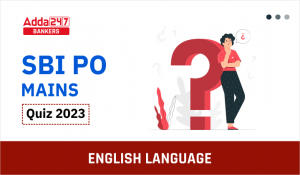
Directions (1-10): Read the following passage carefully and answer the questions given below it. Certain words are given bold to help you to locate them while answering some of the questions.
When I was little, children were bought two kinds of ice-cream, sold from those white wagons with canopies made of silvery metal: either the two-cent or the four-cent ice-cream pie. The two-cent cone was very small, in fact it could fit comfortably into a child’s hand, and it was made by taking the ice-cream from its container with a special scoop and piling it on the cone. Granny always suggested I eat only a part of the cone, then throw away the pointed end, because it had been touched by the vendor’s hand (though that was the best part, nice and crunchy, and it was regularly eaten in secret, after a pretence of discarding it).
The four-cent pie was made by a special little machine, also silvery, which pressed two disks of sweet biscuit against a cylindrical section of ice cream. First you had to thrust your tongue into the gap between the biscuits until it touched the central nucleus of ice cream; then, gradually, you ate whole thing, the biscuit surface softening as they became soaked in creamy nectar. Granny had no advice to give here; in theory the pie had been touched only by the machine; in practice, the vendor had held them in his hand while giving them to us, but it was impossible to isolate the contaminated area.
I was fascinated, however, by some of my peers, whose parents bought them not a four-cent pie but two two-cent cones. These privileged children advanced proudly with one cone in their right hand and one in their left; and expertly moving their head from side to side, they licked first one, then the other. This liturgy seemed to me so sumptuously enviable, that many times I asked to be allowed to celebrate it, in vain. My elders were inflexible: a four-cent ice, yes but two two-cent ones, absolutely no.
As anyone can see, neither mathematics nor economy nor dietetics justified this refusal. Nor did hygiene, assuming that in due course the tips of both cones were discarded. The pathetic, and obviously mendacious, justification was that a boy concerned with turning his eyes from one cone to the other was more inclined to stumble over stones, steps or cracks in the pavement. I dimly sensed that there was another secret justification, cruelly pedagogical, but I was unable to grasp it.
Today, citizen and victim of a consumer society, a civilization of excess and waste (which the society of the thirties was not), I realize that those dear and now departed elders were right. Two two-cent cones instead of one at four cents did not signify squandering, economically speaking, but symbolically they surely did. It was for this precise reason that I yearned for them: because two ice creams suggested excess. And this was precisely why they were denied to me: because they looked indecent, an insult to poverty, a display of fictitious privilege, a boast of wealth. Only spoiled children ate two cones at once, those children who in fairy tales were rightly punished, as Pinocchio was when he rejected the skin and the stalk. And parents, who encouraged this weakness, appropriate to little parvenus, were bringing up their children in the foolish theatre of “I’d like to but can’t.” They were preparing them to turn up at tourist-class check-in with a fake Gucci bag bought from a street peddler on the beach at Rimini.
Nowadays the moralist risks seeming at odds with morality, in a world where the consumer civilization now wants even adults to be spoiled, and promises them always something more, from the wristwatch in the box of detergent to the bonus bangle sheathed, with the magazine it accompanies, in a plastic envelope. Like the parents of those ambidextrous gluttons I so envied, the consumer civilization pretends to give more, but actually gives, for four cents, what is worth four cents. You will throwaway the old transistor radio to purchase the new one, that boasts an alarm clock as well, but some inexplicable defect in the mechanism will guarantee that the radio lasts only a year. The new cheap car will have leather seats, double side mirrors adjustable from inside, and a panelled dashboard, but it will not last nearly so long as the glorious old Fiat 500, which, even when it broke down, could be started again with a kick.
The morality of the old days made Spartans of us all, while today’s morality wants all of us to be Sybarites.
Q1. Which of the following cannot be inferred from the passage?
(a) Today’s society is more extravagant than the society of the 1930s.
(b) The act of eating two ice cream cones is akin to a ceremonial process.
(c) Elders rightly suggested that a boy turning eyes from one cone to the other was more likely to fall.
(d) Despite seeming to promise more, the consumer civilization gives away exactly what the thing worth.
(e) The consumer civilization attempts to spoil children and adults alike.
Q2. In the passage, the phrase “little parvenus” refers to
(a) Naughty midgets.
(b) Old hags.
(c) Arrogant people.
(d) Young upstarts.
(e) Foolish kids.
Q3. The author pined for two-cent cones instead of one four-cent pie because
(a) It made dietetic sense.
(b) It suggested intemperance.
(c) It was more fun.
(d) It had a visual appeal.
(e) He was a glutton.
Q4. What does the author mean by “nowadays the morality risks seeming at odds with morality”?
(a) The moralists of yesterday have become immoral today.
(b) The concept of morality has changed over the years.
(c) Consumerism is amoral.
(d) The risks associated with immorality have gone up.
(e) The purist’s view of morality is fast becoming popular.
Q5. According to the author, the justification for refusal to let him eat two cones was plausibly
(a) Didactic
(b) Dietetic
(c) Dialectic
(d) Diatonic
(e) Diastolic
Q6. In the passage, the phrase “These privileged children ” refers to
(a) those who had full cones of choco icecream
(b) children ate two cones at once
(c) whose parents bought them a four-cent pie and two two-cent cones with the best part, nice and crunchy
(d) whose parents bought them not a four-cent pie but two two-cent cones and advanced proudly with one cone in their right hand and one in their left
(e) The four-cent pie was made by a special little machine, also silvery, which pressed two disks of sweet biscuit against a cylindrical section of ice cream
Q7. Which of the following is most nearly opposite in meaning of the word “Sybarite” as used in the passage?
(a)voluptuary
(b)epicure
(c)puritan
(d)hedonist
(e)seeker
Q8. Which of the following is most nearly similar in meaning of the word “liturgy” as used in the passage?
(a) ritual
(b) lethargic
(c) integrity
(d) enormous
(e) inclined
Q9. Which of the following is most nearly similar in meaning of the word “sumptuous” as used in the passage?
(a) consequence
(b) barren
(c) Lavish
(d) conclusion
(e) struck
Q10. Which of the following is most nearly opposite in meaning of the word “stumble” as used in the passage?
(a) complex
(b) continue
(c) lumber
(d) careen
(e) reel
Directions (11-15): Read the following passages carefully and answer the questions given below it. Certain words/phrases have been printed in bold to help you locate them while answering some of the questions.
PASSAGE – I Despite the economic crunch worldwide that saw pulverization of some of the largest banking and finance giants, Indian banking houses have managed to show positive growth this quarter. Some of India’s leading national banks have posted a net profit rise of more than 40% over the last quarter amid global turmoil. This would come as a big shot in the arm for the investors and consumers of these banks even though apprehension is mounting on other banking and broking firms worldwide. One of the main reasons behind the success of these banks this quarter would be their direct banking by the Government India. People take solace in their investments in public sector watching the bailout packages being cashed out by governments all over the world to save big business houses.
PASSAGE – II Other private banks in India have also reported a substantial net profit over the last quarter. Given the international and domestic scenario, one cannot put this down as a mundane achievement. While others are on a cost cutting spree and firing employees, Indian Companies are actually working on boosting staffing in banking and broking sectors. This can be seen as a big boon in the days to come when the current recession eases and the economy gradually comes back on to the fast track. The finance minister has assured Indian public about the sound health of all Indian banks. This could also be evident from the fact that there have been no mergers and takeovers in Indian Banking sector in a contrast to world scenario where finance houses are looking for mergers to cut costs on operations. We definitely are not looking to thrive; rather we are looking for growth, It is just that the pace of growth is a little slow now as compared to a year or two before. These are hard times of test the hard. The weak in business and career will be weeded out and it is sometimes very beneficial for business on the long run.
Q11. What, according to the author, is the reason for the success for Indian national banks in this quarter?
(a) Indian national banks do not have any commitments in troubled foreign markets
(b) These banks can never face the financial crisis because of their sheer size
(c) These banks are ready to give loans at a very low rate of interest
(d) The public is ready to invest in these banks because of the knowledge that these banks get strong support from the Government.
(e) None of these
Q12. What does the phrase ‘shot in the arm’ as used in the passage mean?
(a) Shock
(b) Fear
(c) Encouragement
(d) Anxiety
(e) None of these
Q13. How, according to the author, is the current recession beneficial?
(a) Worldwide, companies have realized that India is a strong power to reckon with
(b) India is surging ahead of the other companies throughout the world
(c) After the recession is over international companies will turn to India for investments
(d) Recession is bringing down the prices of essential commodities
(e) None of these
Q14. What, according to the author, will be a big boon in the days to come?
(a) The economy coming back on the fast track
(b) The slowing down of the economy
(c) Increased hiring in Indian financial sector in times of economic slowdown
(d) The cost cutting carried out by all the companies
(e) None of these
Q15. Which of the following statements is definitely true in the context of the passage?
(A) India has not been affected by the economic slowdown.
(B) Indian Banks are showing growth in this quarter despite the recession.
(C) While banking industry in the West was severely affected by the recession in the past, it is now gradually recovering and showing a positive growth.
(a) Only (A)
(b) Only (B)
(c) Only (C)
(d) Only (A) and (B)
(e) Only (B) and (C)
Solutions
S1. Ans.(c)
Sol. The passage does not imply that “elders rightly suggested.” The other options are hardly inferences, but are more or less stated in the passage at different places.
S2. Ans.(d)
Sol. Parvenus [pronounced: parvenu(y)s] means one that has recently or suddenly risen to an unaccustomed position of wealth or power and has not yet gained the prestige, dignity, or manner associated with it.
S3. Ans.(b)
Sol. This stated in the passage. “It was for this precise reason that I yearned for them: because two ice creams suggested excess.” Intemperance means “excess” or “lack of moderation.”
S4. Ans.(b)
Sol. The answer has to be derived from the second last paragraph. However, elimination works best in this question. The work “immoral” eliminates the first option. The word “amoral” eliminates the third option. Option (d) is irrelevant as there is nothing in the passage to suggest “risk”—the idea has to be eliminated. Option (e) is contrary to what is stated in the passage. The question is itself contrary to this option. Only option (b) can be inferred.
S5. Ans.(a)
Sol. Didactic means making moral observations. It is stated obliquely in the passage, when the writer states,” I dimly sensed that there was another secret justification, cruelly pedagogical, but I was unable to grasp it.” The other options are not worth considering if the meanings of the words are clear to you. Option (b) may be considered but the writer denies that the reason was dietetic, hence eliminated.
S6. Ans.(d)
Sol. Correct choice is Option D.
S7. Ans.(c)
Sol. Sybarites- a person who is self-indulgent in their fondness for sensuous luxury.
synonyms- hedonist, sensualist, voluptuary, libertine, pleasure seeker, playboy, epicure, glutton, gourmand, gastronome
S8. Ans.(a)
Sol. Liturgy-a form or formulary according to which public religious worship, especially Christian worship, is conducted
synonyms- ritual, worship, service, ceremony, rite, observance, celebration, ordinance, office
S9. Ans.(c)
Sol. Sumptuous- splendid and expensive-looking. Synonyms- lavish, luxurious, deluxe, opulent, magnificent, resplendent, gorgeous, splendid, grand
S10. Ans.(b)
Sol. Stumble- to walk unsteadily or clumsily, to speak or act in a hesitant or faltering manner, to trip in walking or running
S11. Ans.(d)
Sol. the public is ready to invest in these banks because of the knowledge that these banks get strong support from the Government. (Refer last two sentences of para 1)
S12. Ans.(c)
Sol. something that has a sudden and positive effect on something, providing encouragement and new activity. Hence Option C.
S13. Ans.(e)
Sol. Refer to these lines. “While others are on a cost cutting spree and firing employees, Indian Companies are actually working on boosting staffing in banking and broking sectors. “. Here author talks about the benefits of recession only on the banking sector in India.
S14. Ans.(c)
Sol. Increased hiring in Indian financial sector in times of economic slowdown (Refer para 2)
S15. Ans.(b)
Sol. (A) is not true because the passage says that “the pace of growth is a little slow now.” (B) is true from the very first sentence of the passage. (C) is false as the recession still has its impact in the passage.
Click Here to Register for Bank Exams 2021 Preparation Material



 English Quizzes For SBI PO Mains 2023 - ...
English Quizzes For SBI PO Mains 2023 - ...

